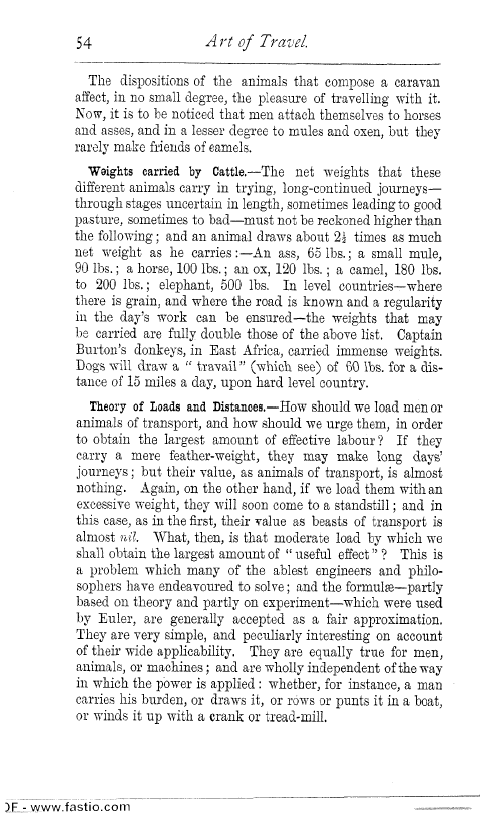| ||||||

OCR Rendition - approximate54 Art of Travel. The dispositions of the animals that compose a caravan affect, in no small degree, the pleasure of travelling with it. Now, it is to be noticed that men attach themselves to horses and asses, and in a lesser degree to mules and oxen, but they rarely make friends of camels. Weights carried by Cattle.-The net weights that these different animals carry in trying, long-continued journeysthrough stages uncertain in length, sometimes leading to good pasture, sometimes to bad-must not be reckoned higher than the following ; and an animal draws about 22 times as much net weight as he carries:-An ass, 65 lbs.; a small mule, 90 lbs. ; a horse, 100 lbs. ; an ox, 120 lbs. ; a camel, 180 lbs. to 200 lbs. ; elephant, 500 lbs. In level countries-where there is grain, and where the road is known and a regularity in the day's work can be ensured-the weights that may be carried are fully double those of the above list. Captain Burton's donkeys, in East Africa, carried immense weights. Dogs will draw a " Travail" (which see) of 60 lbs. for a distance of 15 miles a day, upon hard level country. Theory of Loads and Distances.-How should we load men or animals of transport, and how should we urge them, in order to obtain the largest amount of effective labour ? If they carry a mere feather-weight, they may make long days' journeys ; but their value, as animals of transport, is almost nothing. Again, on the other hand, if we load them with an excessive weight, they will soon come to a standstill ; and in this case, as in the first, their value as beasts of transport is almost nil. What, then, is that moderate load by which we shall obtain the largest amount of " useful effect " ? This is a problem which many of the ablest engineers and philosophers have endeavoured to solve ; and the formulae-partly based on theory and partly on experiment-which were used by Euler, are generally accepted as a fair approximation. They are very simple, and peculiarly interesting on account of their wide applicability. They are equally true for men, animals, or machines ; and are wholly independent of the way in which the power is applied : whether, for instance, a man carries his burden, or draws it, or rows or punts it in a boat, or winds it up with a crank or tread-mill. )F - www.fastio.com |